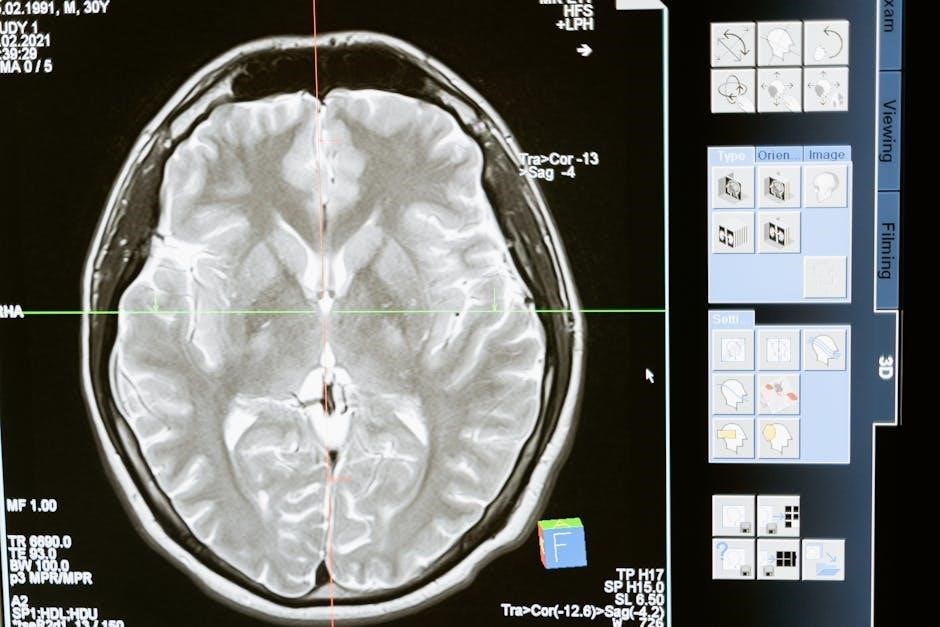A pre-algebra test is an assessment designed to evaluate a student’s mathematical skills and readiness for algebra․ It helps determine placement in appropriate math courses and ensures a solid foundation for higher-level math concepts․ These tests often cover integers‚ ratios‚ and basic operations‚ providing insight into a student’s academic progress and preparedness for advanced studies․
1․1 What is a Pre-Algebra Test?
A pre-algebra test is an assessment evaluating a student’s readiness for algebra by testing foundational math skills․ It typically covers integers‚ ratios‚ and basic operations‚ ensuring a solid understanding of essential concepts․ The test helps determine appropriate course placement and identifies areas needing improvement before advancing to higher-level math․ Calculators are often not permitted‚ emphasizing mental math proficiency․
1․2 Importance of Pre-Algebra Tests
Pre-algebra tests are crucial for assessing a student’s readiness for algebra and higher-level math․ They help identify strengths and weaknesses‚ ensuring proper course placement․ These tests also guide educators in tailoring instruction to meet individual needs‚ fostering academic success and building a strong math foundation essential for future studies․
Key Topics Covered in Pre-Algebra Tests
Pre-algebra tests cover essential math areas like integers‚ ratios‚ proportions‚ and order of operations‚ preparing students for advanced math concepts and algebraic thinking․
2․1 Integers and Basic Operations
Pre-algebra tests often include questions on integers and basic operations‚ such as addition‚ subtraction‚ multiplication‚ and division․ Students are expected to understand properties like commutativity and associativity․ Problems may involve multi-digit calculations‚ negative numbers‚ and absolute values․ Mastery of these skills is fundamental for advancing to algebra and higher-level mathematics‚ ensuring a strong numerical foundation․
2․2 Ratios‚ Proportions‚ and Percent
Pre-algebra tests frequently assess understanding of ratios‚ proportions‚ and percentages․ Ratios compare quantities‚ while proportions equate ratios․ Percentages represent parts per hundred‚ often used in real-world applications like discounts or growth rates․ Students are expected to simplify ratios‚ solve proportion problems‚ and convert between fractions‚ decimals‚ and percentages‚ demonstrating foundational skills for algebraic reasoning and practical problem-solving․
2․3 Order of Operations
The order of operations‚ remembered by PEMDAS‚ guides how to evaluate expressions: Parentheses‚ Exponents‚ Multiplication/Division‚ and Addition/Subtraction․ Pre-algebra tests include problems like 6 × 3(9 ⸺ 7) or 8 × (1 + 3) ー 1‚ assessing students’ ability to apply this hierarchy correctly․ Accurate execution ensures correct answers and demonstrates foundational math skills essential for algebra․

Pre-Algebra Test Format and Structure
Pre-algebra tests typically include multiple-choice and open-response questions‚ covering integers‚ ratios‚ and basic operations․ Time limits vary‚ often between 40-60 minutes‚ with specific instructions on permitted tools like calculators or note paper‚ ensuring a fair and standardized assessment environment․
3․1 Multiple-Choice Questions
Pre-algebra tests often feature multiple-choice questions to assess understanding of key concepts․ These questions cover topics like integers‚ ratios‚ and basic operations‚ with options provided for selection․ They are designed to evaluate problem-solving skills and mathematical reasoning․ For example‚ a question might ask to simplify an expression or solve for a variable‚ with answers labeled A through D․ This format helps ensure clarity and fairness in assessment․
3․2 Open-Response Questions
Open-response questions require students to provide detailed‚ written answers‚ demonstrating their problem-solving process․ These questions assess critical thinking and the ability to communicate mathematical reasoning․ Examples include solving equations‚ simplifying expressions‚ or explaining concepts․ This format allows for a deeper understanding of a student’s mastery of pre-algebra topics and their ability to apply knowledge effectively․
3;4 Time Limits and Instructions
Pre-algebra tests typically have set time limits‚ often ranging from 40 to 60 minutes‚ to ensure timely completion․ Instructions emphasize showing all work‚ using note paper effectively‚ and avoiding prohibited items like calculators or cheating sheets․ Clear labeling of answers is crucial‚ and students must adhere to test rules to ensure accurate assessment of their skills and readiness for higher-level math․

Resources for Pre-Algebra Test Preparation
Free printable worksheets‚ online practice exams‚ and recommended study guides are essential resources for pre-algebra test preparation․ These tools help students practice and master key math concepts effectively․
4․1 Free Printable Worksheets
Free printable worksheets are an excellent resource for pre-algebra test preparation․ They cover topics like integers‚ ratios‚ and basic operations‚ allowing students to practice specific skills․ Websites like Math Mammoth and Infinite Pre-Algebra offer customizable worksheets‚ enabling targeted practice․ These materials are ideal for self-study and help students identify areas needing improvement before taking the test․
4․2 Online Practice Exams
Online practice exams provide realistic test experiences‚ helping students assess their readiness for pre-algebra․ Many websites offer free exams with answer keys and explanations‚ allowing self-assessment and improvement․ These resources often cover topics like integers‚ ratios‚ and operations‚ enabling targeted practice․ They are a valuable tool for identifying strengths and areas needing additional focus․
4․3 Recommended Study Guides
Recommended study guides for pre-algebra tests are essential tools for comprehensive preparation․ Resources like Teaching Textbooks and Math Mammoth offer detailed lessons and practice problems․ These guides provide step-by-step solutions‚ ensuring students understand concepts thoroughly․ They are designed to complement online practice exams‚ covering topics like integers‚ ratios‚ and operations․ Using these guides helps build a strong foundation for algebra and beyond․

Tips for Pre-Algebra Test Preparation
Regular practice‚ understanding test formats‚ and focusing on weak areas are key to success․ Use study guides‚ online resources‚ and seek help when needed to build confidence and mastery․
5․1 Understanding the Test Format
Understanding the test format is crucial for effective preparation․ Familiarize yourself with question types‚ such as multiple-choice and open-response questions․ Review time limits and instructions carefully․ Knowing the structure helps manage time and reduces test anxiety․ Practice with sample tests to build confidence and ensure readiness for the actual exam format․
5․2 Practicing Regularly
Regular practice is essential for mastering pre-algebra concepts․ Use free printable worksheets and online practice exams to reinforce skills․ Consistent practice helps identify weak areas‚ builds problem-solving speed‚ and enhances confidence․ Allocate time daily to review and solve problems‚ ensuring a strong foundation for test success and future math courses․
5․3 Focusing on Weak Areas
Identify and address weak areas in pre-algebra by analyzing test results and practice outcomes․ Use targeted worksheets and online resources to strengthen understanding of challenging topics like integers‚ ratios‚ and operations․ Regular review of mistakes helps build proficiency and confidence‚ ensuring a well-rounded skill set for the test and future math studies․
Scoring and Interpretation of Results
Results determine readiness for algebra‚ guiding placement in appropriate math courses․ Scores reflect mastery of pre-algebra concepts‚ helping identify areas for further review and improvement․
6․1 How Tests Are Graded
Pre-algebra tests are typically graded based on the number of correct answers‚ with each question assigned a specific point value․ Multiple-choice questions are scored objectively‚ while open-response questions may allow partial credit for correct reasoning․ The total possible score is calculated by summing points from all sections‚ providing a clear measure of a student’s understanding and readiness for advanced math․
6․2 Understanding Your Score
Your score reflects your mastery of pre-algebra concepts‚ often presented as a percentile or percentage․ Higher scores indicate stronger understanding and readiness for algebra․ Benchmarks may be provided to compare performance with peers․ Understanding your score helps identify strengths and areas needing improvement‚ guiding focused study and ensuring proper placement in math courses․
6․3 Using Results for Placement
Pre-algebra test results determine appropriate math course placement‚ ensuring students are challenged yet supported․ High scores may advance learners to algebra or higher-level courses‚ while others may need foundational review․ Placement decisions are tailored to individual readiness‚ fostering academic growth and preparedness for subsequent math studies․

Tools and Calculators Allowed
Basic tools like pens and pencils are permitted․ Calculators are generally not allowed․ Cheating sheets are prohibited․ Note paper may be used for calculations effectively․
7․1 Permitted Calculators
Basic four-function or scientific calculators are typically allowed for pre-algebra tests‚ but graphing calculators are usually prohibited․ Ensure the calculator is simple and does not have advanced features․ Always verify the test’s specific guidelines to confirm permitted tools‚ as policies may vary․ This helps maintain fairness and focuses on problem-solving skills rather than technology reliance․
7․2 Prohibited Items
Prohibited items include cell phones‚ smartwatches‚ and any unauthorized materials like cheating sheets․ Calculators with advanced features‚ such as graphing capabilities‚ are also not allowed․ Students must rely on their knowledge and problem-solving skills․ Ensure all prohibited items are kept away to maintain the integrity and fairness of the test environment․
7․3 Using Note Paper Effectively
Use note paper to organize your thoughts and solve problems step-by-step․ Write down key steps clearly to avoid mistakes․ Label answers neatly and ensure legibility․ Manage time by not spending too long on one problem․ Note paper helps track progress and review work‚ especially when calculators are prohibited․ Keep it tidy for easy reference․
Avoiding Common Mistakes
Common mistakes include careless errors and poor time management․ Read instructions carefully‚ double-check calculations‚ and allocate time wisely to each question to ensure accuracy and completeness․
8․1 Careless Errors
Careless errors often occur due to rushing or lack of attention․ Double-checking work‚ reading questions carefully‚ and managing time effectively can significantly reduce mistakes․ Ensuring all steps are shown and calculations are accurate helps prevent avoidable errors‚ improving overall test performance and confidence․
8․2 Time Management
Effective time management is crucial during pre-algebra tests․ Allocate time evenly to each question‚ avoiding prolonged focus on a single problem․ Prioritize solving easier questions first to secure points quickly․ Skip challenging questions initially and return to them later․ Practice pacing during study sessions to build confidence and maintain momentum throughout the test․
8․3 Cheating Prevention
Ensure academic integrity by prohibiting calculators‚ cheat sheets‚ and unauthorized materials․ Emphasize the importance of relying on personal knowledge and skills․ Encourage honest completion of tests to accurately assess readiness․ Cheating undermines learning and test validity‚ leading to inappropriate placements․ Provide clear instructions and consequences to maintain a fair environment for all students․
Placement and Next Steps
Pre-algebra tests evaluate readiness for algebra‚ guiding placement in appropriate math courses․ Results help determine if students need additional support or can advance to higher-level math studies․ Accurate placement ensures students are challenged yet comfortable‚ fostering academic growth and preparedness for future math challenges․
9․1 Determining Readiness for Algebra
Pre-algebra tests evaluate readiness for algebra by assessing problem-solving skills and understanding of key mathematical concepts․ Results determine if students are prepared for higher-level math or need additional support․ These tests often cover essential topics like integers‚ ratios‚ and operations‚ ensuring a solid foundation for advancing to algebra studies successfully․
9․2 Advancing to Higher-Level Math
Pre-algebra tests help students transition smoothly to higher-level math by ensuring mastery of foundational concepts․ Strong performance indicates readiness for algebra and beyond‚ while areas needing improvement are addressed․ These assessments guide placement and curriculum adjustments‚ enabling students to advance confidently to more challenging math courses with a solid skill base․
9․4 Seeking Additional Help
Students who need extra support can access free printable worksheets and online practice exams to reinforce pre-algebra concepts․ Utilizing recommended study guides and seeking tutoring are effective ways to address weaknesses․ Teachers and online resources provide additional help‚ ensuring students grasp essential skills before advancing to higher-level math courses․
Mastering pre-algebra is essential for academic success․ Consistent practice and understanding key concepts will build a strong foundation․ Seek help when needed‚ and stay confident in your abilities to excel․
10․1 Final Tips for Success
To succeed in pre-algebra‚ stay calm and manage your time wisely during tests․ Avoid careless errors by reading questions carefully․ Practice regularly‚ focusing on weak areas‚ and review mistakes to improve․ Seek help when needed‚ and use resources like worksheets or online exams to reinforce learning․ Confidence and consistent effort lead to success․
10․2 Staying Confident
Stay confident by maintaining a positive mindset and believing in your abilities․ Understand your strengths and embrace challenges as opportunities to grow․ A confident attitude enhances problem-solving skills and reduces test anxiety․ Remember‚ preparation and practice build resilience‚ helping you approach pre-algebra tests with self-assurance and determination for success․